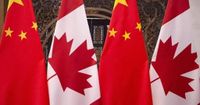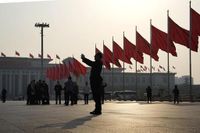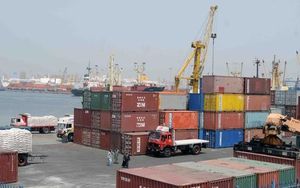Canada's government has condemned the execution of four Canadians by China earlier this year, a move that has intensified the already fraught diplomatic relations between the two countries. On March 19, 2025, Foreign Affairs Minister Mélanie Joly addressed reporters, confirming the executions were linked to drug-related crimes. She emphasized Canada’s opposition to the death penalty, calling the situation a serious concern for all the families involved.
According to the Canadian government, the details surrounding the executions remain vague, as the identities of the individuals executed have not been publicly disclosed at the request of their families. "Our hearts and minds are with the families," Joly stated during a press briefing. She and former prime minister Justin Trudeau had both personally appealed for leniency in these cases, although little could be done to change the Chinese government's stance on its strict anti-drug laws.
The Chinese embassy in Ottawa confirmed the executions took place, insisting that they had solid evidence against the Canadians. A spokesperson for the embassy asserted, "The facts of the crimes committed by the Canadian nationals involved in the cases are clear, and the evidence is solid and sufficient." This firm response underscores China's hardline position on drug offenses, which it treats with utmost severity. The embassy claimed that anyone who contravenes Chinese law must be held accountable.
Human rights organizations are reacting strongly to the news of the executions. Ketty Nivyabandi, Secretary General of Amnesty International Canada, expressed profound concern: "These shocking and inhumane executions of Canadian citizens by Chinese authorities should be a wake-up call for Canada. We are devastated for the families of the victims... They deserve answers and justice, not the sickening worry they have been subjected to because of years of separation and uncertainty." This sentiment was echoed by other human rights advocates who are calling on the federal government to impose greater pressure on China concerning its punitive measures and treatment of foreign nationals.
Amnesty International has long condemned the death penalty in all cases without exception, regardless of the crime. France-Isabelle Langlois, director general of Amnistie internationale Canada francophone, reiterated this call, emphasizing that Canada must take a more proactive role in protecting its citizens abroad.
The executions come at a particularly tense time in Canada-China relations, which hit a nadir following the 2018 arrest of Huawei executive Meng Wanzhou at the behest of U.S. authorities. Following her arrest, China detained two Canadians, Michael Kovrig and Michael Spavor, on accusations of espionage—a move widely perceived as retaliation for Meng's detention. Although Kovrig and Spavor were released in 2021, relations have remained strained.
On trade, the tensions have also escalated, particularly after Canada's imposition of tariffs on Chinese-made electric vehicles and other goods last year, leading China to retaliate with tariffs on Canadian agricultural exports. The cyclical nature of these tariffs illustrates the complicated and often antagonistic relationship between the two nations.
Michael Kovrig, reflecting on the current situation, noted that China's reaction should not be taken lightly. He conveyed that the execution of foreigners is extremely rare in China, which further complicates efforts toward diplomatic negotiations, stating that these events reflect a disregard for human rights. "These wrongful deaths are a result of a highly politicized justice system... Executing a number of Canadians in short order is unprecedented, and is clearly a sign that Beijing has no intention of improving relations with Canada," said Conservative Foreign Affairs Critic Michael Chong.
The suggestion of maintaining and amplifying Canada’s stance on human rights is echoed across various sectors. Kovrig advocates for using trade conditions as leverage, proposing that Canada clearly articulate a stance that there will be no advancement in trade discussions until human rights concerns are addressed. Such coordinated pressure alongside other nations might encourage a shift in Chinese behavior.
Despite efforts to stabilize post-COVID pandemic international relationships, many experts believe the diplomatic landscape remains littered with challenges, particularly for countries like Canada that are navigating the complex realities of dealing with an assertive China. Vina Nadjibulla from the Asia Pacific Foundation of Canada reflected this concern, stating, "This is a clear, disturbing development in the bilateral relationship," stressing that any optimism about improving relations is fading.
Furthermore, the executions have prompted renewed travel advisories for Canadians considering travel to China, warning of potential risks associated with engaging in activities that may lead to legal ramifications. The Canadian government has been cautious to remind citizens that potential legal troubles abroad can have severe consequences that are unyielding and irreversible under stringent foreign laws.
As this situation continues to evolve, the federal government remains vigilant in providing consular assistance to those affected and continues to push back against the use of the death penalty, reinforcing its stance that human dignity and justice must be upheld, regardless of international complexity or ramifications.









